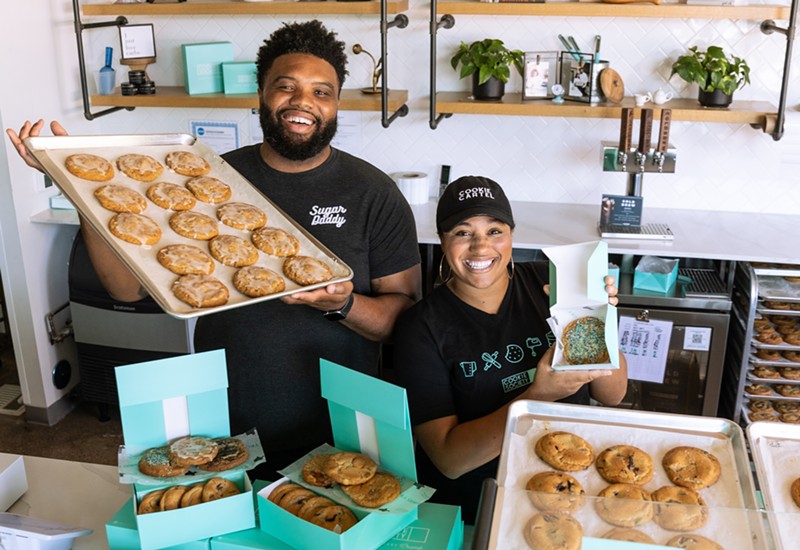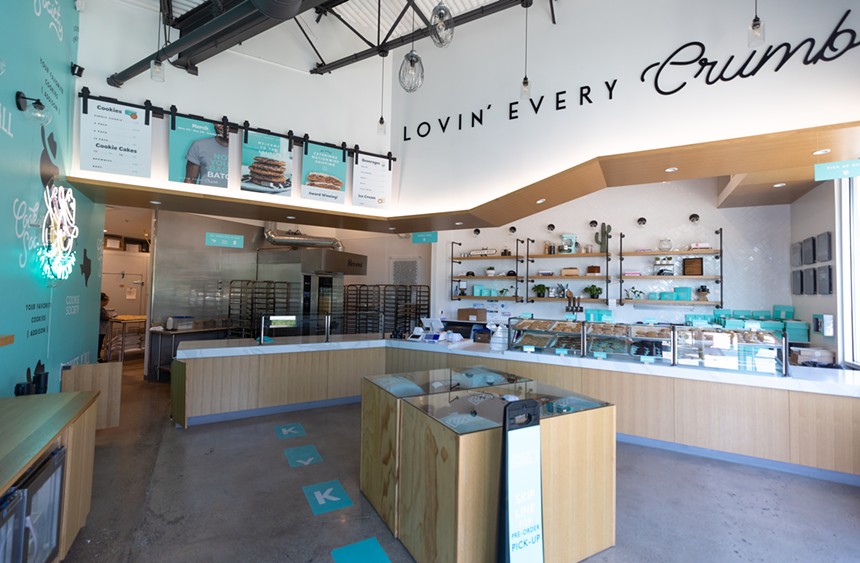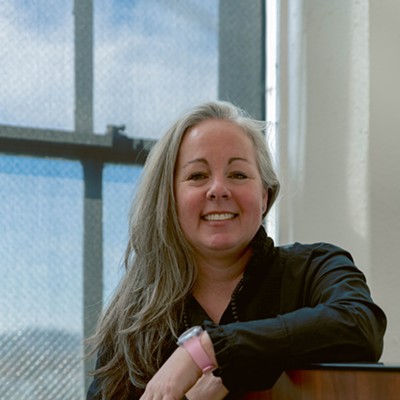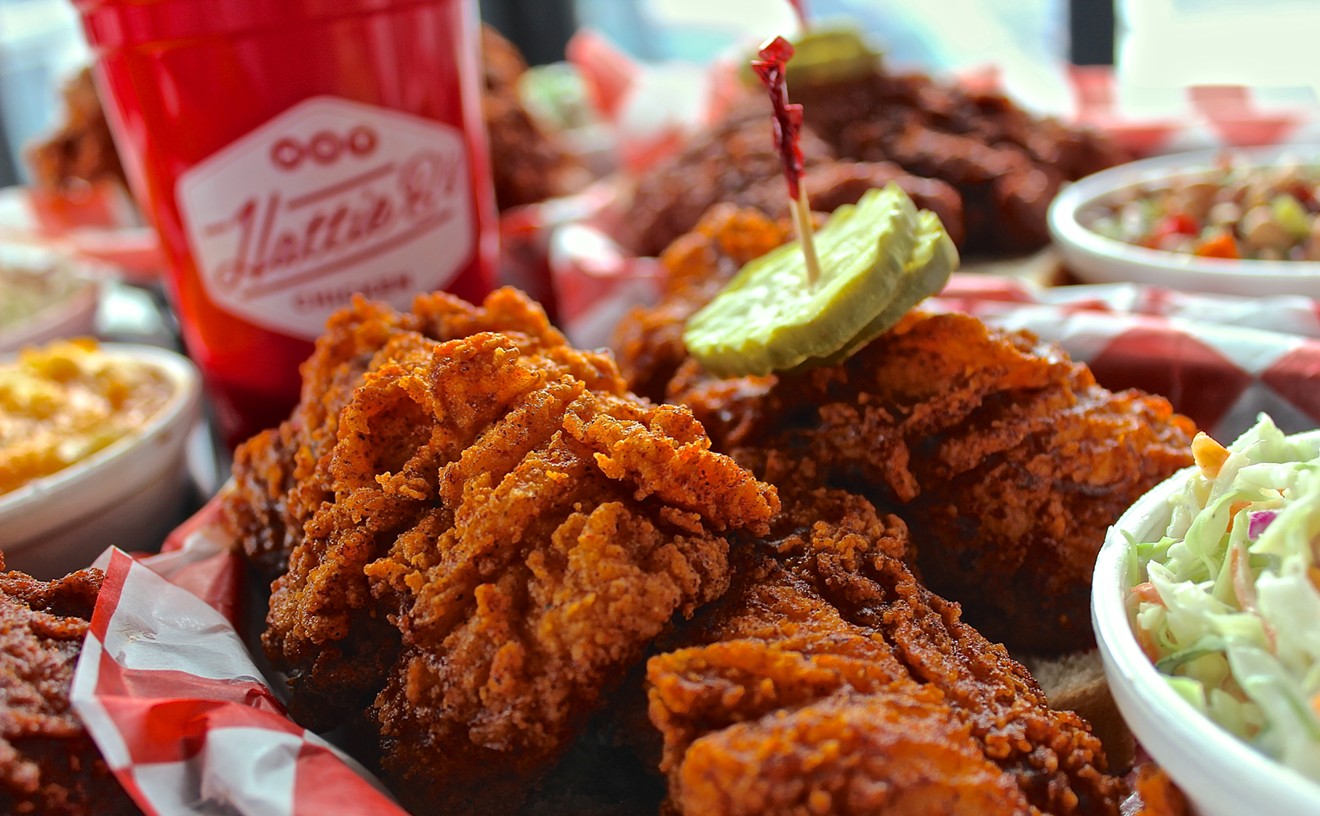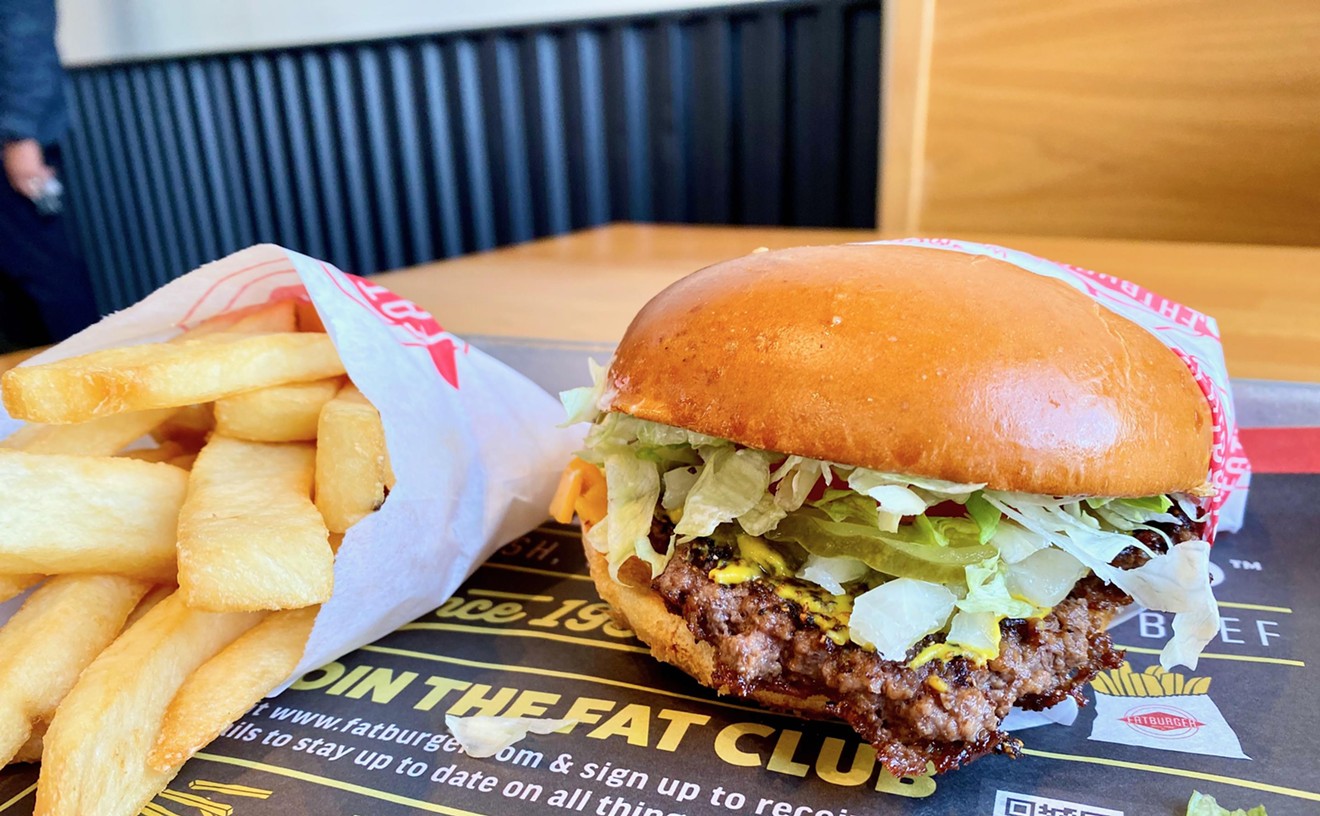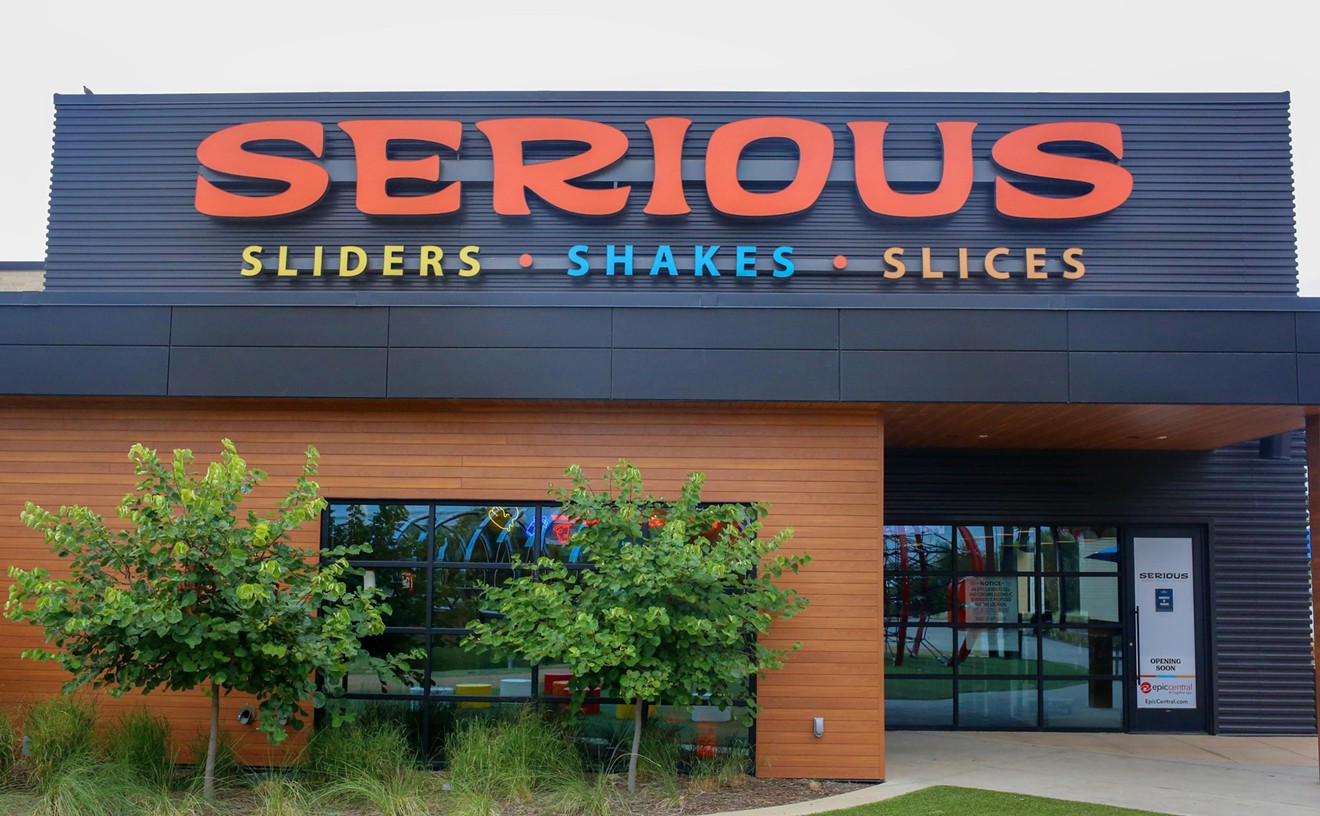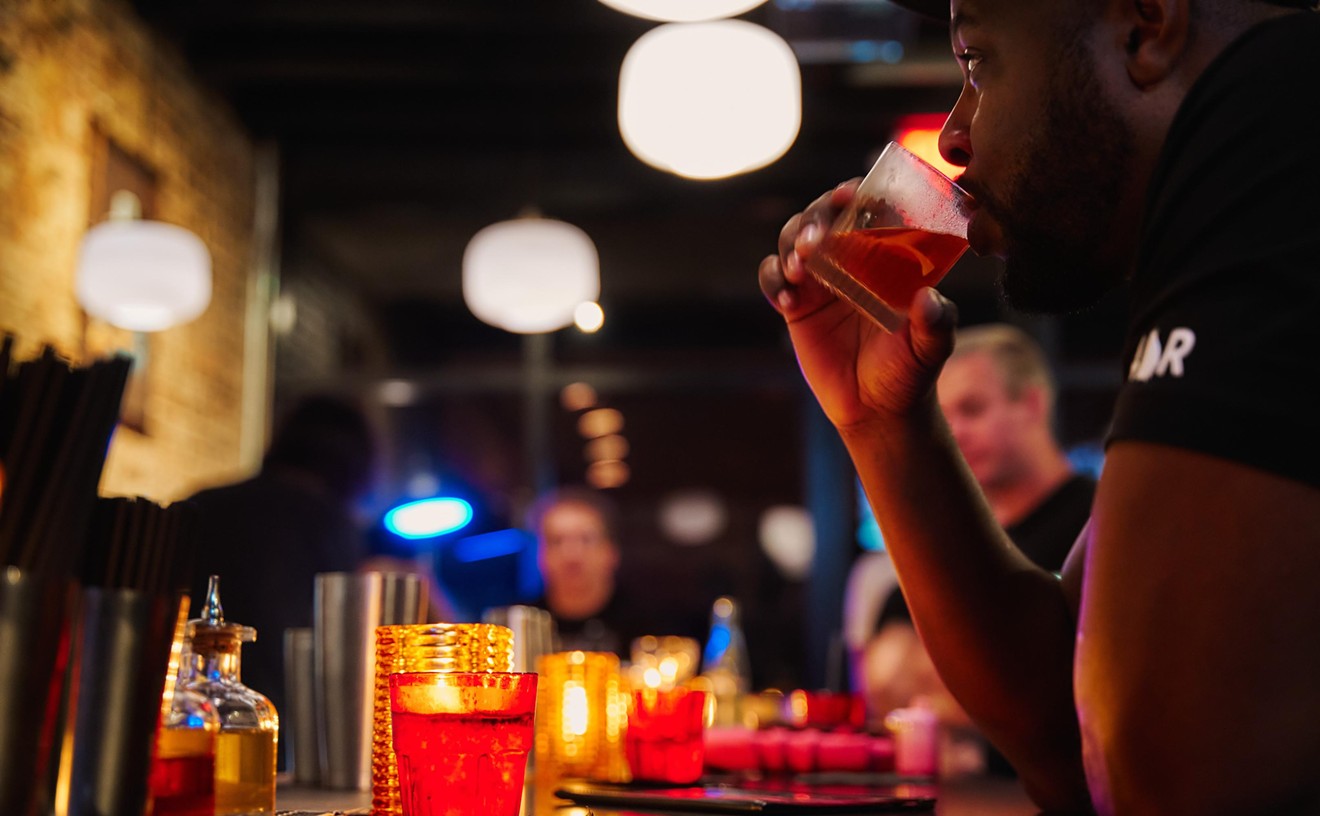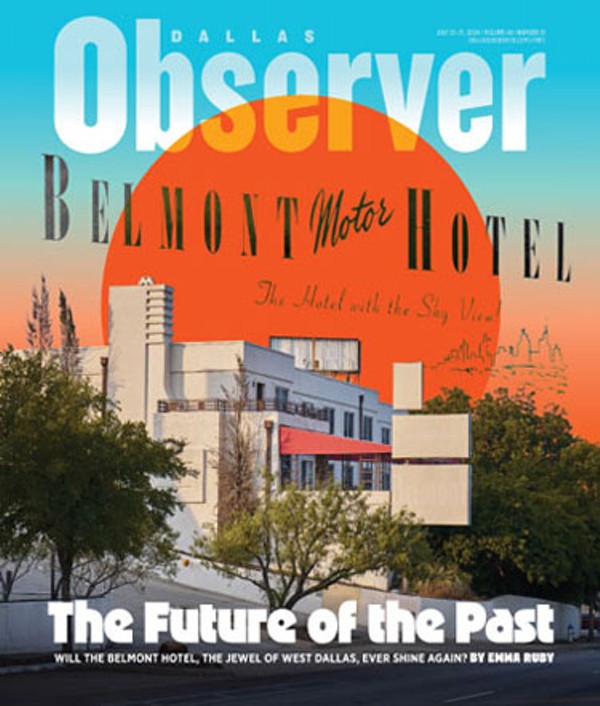“It was kind of my intro,” Marissa says with a smile and shrug. “‘I made these cookies for you,’ and I made friends.”
“That’s how it started. I was like, ‘Hey, you can sell this,’” husband Jeff adds.
She made many friends, and her cookies are amazing: thick but light, crumbly but not dry. The flavors, like Pop-Tarts and lemon, are spot on. In fact, you may never eat another Pop-Tart after having one of her cookies. These are best-friends-for-life cookies.
Marissa and Jeff started dating while at the University of Illinois, where she played soccer and earned a business degree in marketing. He played football and studied sports management. Her cookies started as a friendly bribe and grew to become a small business, at first through mail order. The Allens used Instagram and tapped into their network of friends and family to tell their story and push online orders.

Amber Brown adds frosting to coffee cake cookies at the Addison branch of Cookie Society.
Nathan Hunsinger
They moved to the Dallas area after Jeff’s career as an offensive lineman ended in 2019, and in March 2020 they were preparing to open a storefront in Frisco.
“We thought this would legitimize our shipping business,” Marissa says. “We shipped cookies — we were really good at it. Then we had our own kitchen.” A store was the next step.
Then the pandemic flipped the retail and service industry on its head, washing away the standard business practices. The Allens faced running a brick-and-mortar shop as their shipping business skyrocketed thanks to customers who sought indulgences to while away the hours stuck at home. The first day they moved into their store, they had more than 100 boxes stacked in the hallway that needed to be packed and shipped.
Dan Bui and Connie Cheng faced a similar situation in the Bishop Arts District, where they were preparing to open the Cajun-Asian restaurant and bar Krio. The two had previously worked together at Sisu Uptown, but this was their first time owning their own establishment. They had money tied up in their new spot, plus workers relying on a salary.
Small business owners across the nation had to adapt quickly. Some found clever ways to either stay in business or find new revenue streams. For example, when downtown workers were sent home, Sloane’s Corner in the Trammel Crow Center lost many of its daytime customers. Instead of sitting idle and laying off its workers, Sloane's Corner created Pizza Leila, a virtual kitchen that delivered pizzas to downtown residents, reemploying all its kitchen staff. Since the pandemic, Pizza Leila has endured.
Some restaurateurs tried ghost restaurants, offering takeout and to-go meals, paying for a commercial kitchen but passing on the expensive fixtures that go along with a dining room. Among them was Greg Tierney, who wanted to bring more Detroit-style pizza to the North Texas market. He started Motor City Pizza in a ghost kitchen in October 2020, focusing on delivery, and now he's opening a full-service restaurant.
Supply chains, labor, ingredients and logistics were all in turmoil. So, how did some in the food and service industry go beyond merely navigating the pandemic and thrive? There was no playbook covering the economics of social distancing. Adapting on the fly was key.
With a boatload of determination and inventiveness, entrepreneurs like the Allens, Bui and Cheng learned lessons during the pandemic that the best MBA programs couldn’t provide, and those lessons endure as the pandemic recedes.
****
“We lived here,” Marissa says. In 2020, Cookie Society was open only until 4 p.m., when the Allens would send their crew home and prep cookies themselves until midnight.
“I’d cry. We’d open the fridge, and it’d be empty,” Marissa says of their cookie dough stock for the next day.
Beyond trying to keep up with shipping orders, they were running boxes of cookies to cars outside in the parking lot; they took to-go orders online since customers couldn’t come inside the store.
They needed more equipment, like a much larger commercial mixing bowl. But equipment was trapped in a logistics quagmire, likely on a container ship in the middle of the ocean. They also had a hard time getting ingredients. They tried to have a special Cookie of the Week, but they never knew what ingredients would be available.
“We had to be very lean and flexible because so much was unknown,” Marissa says. “And that has been going on for two years. It’s been the whole time we’ve been in business. We’ve been having to make these constant changes.”
One study in the Journal of Economics and Management Strategy showed that “the number of active business owners in the United States plummeted by 3.3 million or 22% over the crucial two-month window from February to April 2020. The drop in active business owners was the largest on record, and losses to business activity were felt across nearly all industries.”
African-American-owned businesses were hit with a 41% drop in business activity, Asians saw a 26% drop and Hispanics 32%.
“And then Oprah came,” Marissa says as she smacks her hands together, thrusting one skyward to illustrate how business took off. The media empress put Cookie Society on her list of favorite things in 2020. “I felt like I was being chased, like I was Pac-Man.”
While it was a wonderful problem to have, the increased demand meant the Allens needed more of everything they’d already been struggling to rein in: labor, ingredients, time and supplies.
Two years later, the Allens are baking more cookies than they ever dreamed, about 2,500 a day. They’ve opened another store in Addison, which was delayed by months as an electrical component for their kitchen sat on a container ship.
But they let go of any preconceived ideas about how business was supposed to be. Jeff describes it as being on a treadmill when you can barely keep your legs under you. (As a lineman in the NFL, it's probably something he’d had a little experience with.)
At the mention of the iconic sound Pac-Man makes when he dies, Marissa laughs and says, “I’ve had a couple of those moments, but I have a couple of lives left.”
****

Dan Bui and Connie Cheng opened Cajun-Asian restaurant and bar Krio in Bishop Arts District.
Alison McLean
“It’s how we deal with the hand that’s been dealt us,” Haseman says of adapting during COVID and since. “Those who are imaginative, innovative, willing to scrape the bottom of the barrel and make those pennies go further … are going to be successful.”
When talking about the challenges the business went through the past two years, Jeff Allen says, “That’s entrepreneurship,” as though the challenges were opportunities rather than hardships.
From her job as chief public affairs officer for the Texas Restaurant Association, Kelsey Erickson Streufert saw an unprecedented wave of innovation within the food and beverage industry triggered by the pandemic. That innovation has stuck for many, “creating lasting opportunity for restaurants,” Streufert said.
Bui and Cheng opened Krio in March 2020 and had to navigate in a time of uncertainty.
“It’s challenging when you’re expecting revenue to come in and there are salaries to pay,” Bui says, “investing tens of thousands of dollars in inventory and employees who are depending on us to live.”
They focused on the apartments that surrounded their restaurant, full of residents who couldn’t go out at the time. They offered direct delivery, taking orders over the phone and leaving bags of food by doors. “The biggest thing we did to survive was to-go orders and delivery,” Bui says.
Then in the fall of 2021, Bui and Cheng opened another spot not far from Krio called Atlas, a globally inspired cocktail lounge with a small food menu. Here, they read the neighborhood. While nearby bars and restaurants closed on Mondays, as is common, they opted to keep the lights on late on Mondays, giving the many service industry workers who live in the area a place to hang out on their day off. It’s worked.
Bui also focused on food costs, forgoing hyper-inflated ingredients, such as certain varieties of crab, to control prices for both the restaurant and its customers.
The Allens also had to learn how to stretch and repurpose ingredients. Leftover chocolate cookie pieces were used for next month’s cookies-and-cream brownies.
“Eliminating waste has been huge,” Marissa says.

Two years later, the Allens are baking more cookies than they ever dreamed, about 2,500 every day.
Nathan Hunsinger
“Now we have a lot of full-time workers with us, but we had to learn to do more with a smaller team at times,” Marissa says. Fortunately, they’re no longer at the store until midnight. When their daughter started playing soccer, Marissa made it her mission to get enough staff trained so that she could coach.
Finally, they leveraged social media to tell their story, tempting their growing audience with cookies. Using their camera phones and a bit of tech-savvy, they never stopped selling cookies on free social media platforms.
Haseman at UT Dallas says this time of adaptation is by no means ending any time soon.
“I think we’re in a state for multiple years to come where things are going to be moving, the economy is up-and-down, politics is up-and-down, geopolitics is up-and-down and you’ve got the climate. There are many, many things that have a lot more impact than they did four years ago. We’re in a whole new world,” Haseman says. Then, after a slight pause, he adds, “which is great!” for a bit of optimism.
It’s great for those who can adapt to trends with a nimble staff and a streamlined menu and process, all while leaving room for ingenuity. It’s an entrepreneur’s dream.

